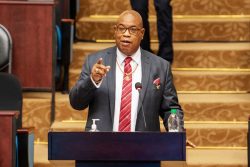Phil Miller is a British investigative journalist based in London. He works as a reporter for the Morning Star newspaper and writes freelance for other publications. You can follow his work at http://www.PhilMiller.info
Guyana’s High Commission in London threw open its doors on Thursday night to tell investors about the country’s newly discovered oilfields. Tellingly, the event was dubbed “Oil Dorado”. British companies Tullow Oil and Stena Drilling are already involved in Guyana’s energy industry, along with US giant Exxon and others. The head of Guyana’s energy department, Dr .Mark Bynoe, spoke to the event via Skype. He said Guyana was “open for business” and could become one of the world’s top 10 oil producers.
However, Bynoe was less keen to answer questions about the prospect of a British military base in Guyana. The concept emerged over the New Year, when Britain’s hawkish defence minister Gavin Williamson told a right-wing newspaper that he wanted to open a new military base in the Caribbean after Brexit. He declined to name exactly which country would host it, but a military source told the paper that Guyana was one of the most likely locations. When I asked Bynoe about this on Thursday night, he appeared rattled and said he “could not answer” any queries about what the British military wanted to do in Guyana.
Bynoe is not the only one to dodge my questions about these putative barracks. Guyana’s foreign ministry has also not responded to numerous requests for comment. Britain’s ambassador in Georgetown, Greg Quinn, has tried to play down suggestions of a new military base there, telling local journalists: “There’s been no specific request to me to look into the possibility about a base here in Guyana.” So, perhaps the mysterious military base plans were just the rantings of a bullish British minister?
And yet the British government is paying close attention to the region right now. Over the last few days, it has amplified Trump’s regime change campaign in Venezuela. The UK Foreign Office has repeatedly denounced Nicholas Maduro’s legitimacy and arrogantly issued an eight-day ultimatum for fresh elections. Such colonial behaviour is reminiscent of Churchill’s treatment of Cheddi Jagan in 1953.
In this context, with Britain brazenly supporting a coup in Venezuela, a UK military base in Guyana no longer seems like such an absurd possibility. British companies have an economic stake in Guyana’s nascent oil industry, something Maduro indirectly threatened before Christmas when the Venezuelan Navy halted an Exxon survey ship.
Quinn, Britain’s ambassador, has made it clear his job is focused on attracting British investment in Guyana’s oil industry. In November 2018, Quinn made a flying visit back to Britain and spent a week in the Scottish oil town of Aberdeen. He was joined there by Guyana’s ambassador to the UK, Frederick Hamley Case, who was leading a trade mission aimed at “building relationships to support the country’s fledgling oil and gas sector”. They toured Scottish energy firms and visited local universities.
During the trip, Quinn told Energy Voice, an industry media website: “A lot of the work that I do is to support the UK companies who are looking to come out” to Guyana. He said the number of British firms arriving in Guyana has “skyrocketed”, since Exxon made its major discovery in 2015. For Quinn, it is only natural that the Foreign Office should help with this process. He said “The bottom line is if there is a company here in Aberdeen that is looking for an opportunity to get into business in Guyana, we should be their first port of call.” There are even reports that Georgetown could twin with Aberdeen.
As early as July 2016, a year after oil was discovered, Britain’s Royal Navy gave four Guyanese personnel a one-week crash course in how to protect their Exclusive Economic Zone – the stretch of water 200 nautical miles from Guyana’s shoreline, which contains the oil fields. Indeed, Britain, like the US, appears keen to influence Guyana’s oil industry, perhaps fearful that Venezuela’s example of a state-controlled energy sector could jeopardise potential profits for Western firms.
At the Oil Dorado event last week, Dr. Bynoe was flanked by Guyana’s oil and gas adviser, Matthew Wilks. Australian-born Wilks spoke with a cut glass English accent and has previously worked for British energy interests. There were surreal moments when Bynoe surrendered control of the laptop so Wilks could swivel it towards him and take command of the skype conversation with the embassy audience. The optics of a white western oil advisor stepping in to field difficult questions that Bynoe struggled to handle spoke volumes.
Like many who attended, I was left wondering how much control over its oil discovery Guyana really has. When one Guyanese expat asked what Exxon would do to help educate young people, he was told “This is a new industry so we don’t want to start regulating it too early”. Indeed, petroleum legislation has been paused. The only success Bynoe and Wilks could point to was 50 Guyanese youngsters who Exxon sent to Houston for training on the new floating oil rigs. Wilks’ even admitted that the “oil industry does not employ a huge amount of people”. Each rig only needs between 100 and 140 crew. If the Oil Dorado event was intended to entice the diaspora to invest in Guyana’s oil industry, it appeared to leave many concerned about whether this the best way forward. Guyanese expats young and old did not seem impressed by Bynoe’s presentation, Wilks’ interruptions or the prospect that a British military base could be in the pipeline.







